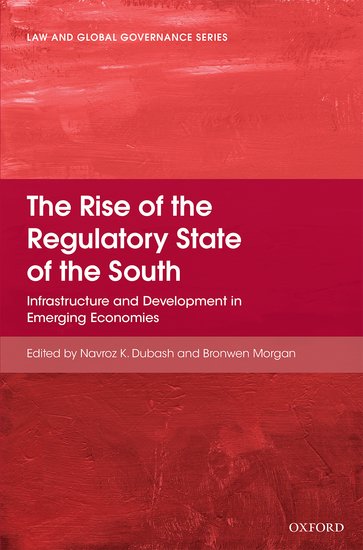This volume seeks to explore the emergence of regulatory agencies in a range of developing countries across Asia, Africa, and Latin America, focusing on telecommunications, electricity, and water. The authors hope that understanding the regulatory state of the south, and particularly forms of accommodation to political pressures, could stimulate a broader conversation around the role of the regulatory state in both north and south. This book will provide valuable theoretical and empirical material to people working in economics, development, political science and law, writes Matt Birkinshaw.
 The Rise of the Regulatory State of the South: Infrastructure and Development in Emerging Economies. Navroz K. Dubash and Bronwen Morgan (eds.). Oxford University Press. July 2013.
The Rise of the Regulatory State of the South: Infrastructure and Development in Emerging Economies. Navroz K. Dubash and Bronwen Morgan (eds.). Oxford University Press. July 2013.
The Rise of the Regulatory State of the South, a new collection edited by Navroz K. Dubash and Bronwen Morgan, offers plenty of rich empirical material and fresh ideas in rethinking economic regulation from a ‘southern’ perspective. It will be particularly useful to readers in development, economics, law, comparative politics, or public administration.
Dubash, now Senior Fellow at Delhi’s Centre for Policy Research, may be familiar to those interested in south Asia, water, or agrarian transition from his earlier book, Tubewell Capitalism. Morgan, also with a research interest in water, is currently Professor of Law at the University of New South Wales. Contributors to the book come from a range of disciplines, particularly political science and law, but also economy, planning, and sociology, and are well distributed geographically, with good representation from the Americas and southern Asia.
How best to govern market power in society is a long-standing question. From the 1970s, in Europe and North America approaches increasingly centred on sectoral regulation through agencies empowered to make technocratic decisions without political interference – ‘the regulatory state’. During the 1990s governments across the developing world instituted this template as a component of privatisation and liberalisation processes. However, ‘regulatory states’ in the South function in quite different ways to their Northern templates. The book’s title references articles on ‘the rise of the regulatory state’ in Europe, Britain and America but uses a ‘Southern’ perspective to highlight the importance of bringing politics into regulation theory. The central claim is that the creation of apparently ‘independent’ regulatory authorities in ‘the South’ does not necessarily result in decision-making free from political or social influence.
Tracing the divergent developments in electricity regulation across Indian states, Dubash’s own chapter in the book foregrounds this argument about political influence. India’s power sector in the 1990s was in a state of crisis following struggles by political interests, particularly across classes of users (agriculture, industry, domestic), which had left it on very weak financial footing. International donor agencies put strong pressure on adoption of regulation as a means of removing decision making from the political arena. Examining the careers of these regulatory bodies in Andrah Pradesh, Delhi, and Karnataka, Dubash argues firstly that regulatory institutions may not only fail to reduce political pressures on decision-making but can increase it through new channels – or act as a ‘policy irritant’ by introducing unexpected effects. Dubash argues that conflicts between regulatory independence and political constraints can lead to adjustments and workarounds, which ‘preserve the myth of regulatory autonomy and technocracy, even while allowing for the accommodation of political pressures’ (p.107).
The second main argument of The Rise of the Regulatory State as a whole is that regulation can function not simply as a limit on markets, but more positively in a developmental aspect to deliver improved socio-economic outcomes. While mechanistic institutional transplants are insufficient to depoliticize regulation, the rationales given for decisions, and the form and locations of negotiations over those decisions, do change. Dubash cites the introduction of new processes in regulatory design as providing an increased range of accountability and participatory possibilities, and argues that we can see these as ‘embryonic new sites for democratic politics around service delivery’, and a potentially conducive setting for ‘regulatory society’.

Urueña’s opening chapter on global water governance and the ‘constitutional regulatory state’ in Colombia illustrates this more positive model of ‘extended’ regulation. In contrast to received understandings, Urueña’s case highlights a blurring of regulation and redistribution through an active role of the courts. Water regulation in Colombia was informed as much by constitutional and human-rights-based legal advocacy as by economic arguments for efficient markets. The coming together of these two movements established a space for negotiation that Urueña calls a ‘constitutional regulatory state’.
In their conclusion, Dubash and Morgan suggest that regulatory states should be understood as shaped by contextual factors and positioned on a continuum between ‘rules’ and ‘deals’. Since regulatory bodies are invariably subject to political pressures, we can more helpfully view their role as ‘facilitating legitimate forms of negotiation, rather than as neutral rulemakers, monitors and enforcers’ (pp. 281-2). Dubash and Morgan suggest that regulatory institutions could develop their tendency for to act as democratic spaces with greater focus on structured negotiation, the role of judiciary and civil society, and facilitated access for the politically disadvantaged (pp. 294-5).
One of the things I particularly like about The Rise of the Regulatory State of the South is its division into two sections: case studies and commentaries. The first section maintains a strong empirical focus to examine regulation reform in infrastructure, particularly water, electricity and telecoms in Argentina, Brazil, Colombia, Egypt, India and the Philippines. The second commentaries section (including chapters by Jordana and Levi-Faur) both offers the reader a range of readings and interpretations and makes connections to more general arguments.
This is not always an easy book to read, but it is rewarding. The prose is clear but the content is sometimes complex and at quite a high level of abstraction or dense with descriptive detail. A strength of the book is that the chapters, cases and commentaries, cover a range of perspectives and do not necessarily present a single point of view. This book will provide valuable theoretical and empirical material to people working in economics, development, political science and law. For LSE library members, the e-book is available. Some of the papers the book is based on are also available in a special issue of Regulation and Governance.
—————————————————–
Matt Birkinshaw is PhD candidate in Human Geography & Urban Studies at the London School of Economics. Matt researches governance and infrastructure in Indian cities with a focus on urban water and municipal reforms. Read more reviews by Matt.








1 Comments